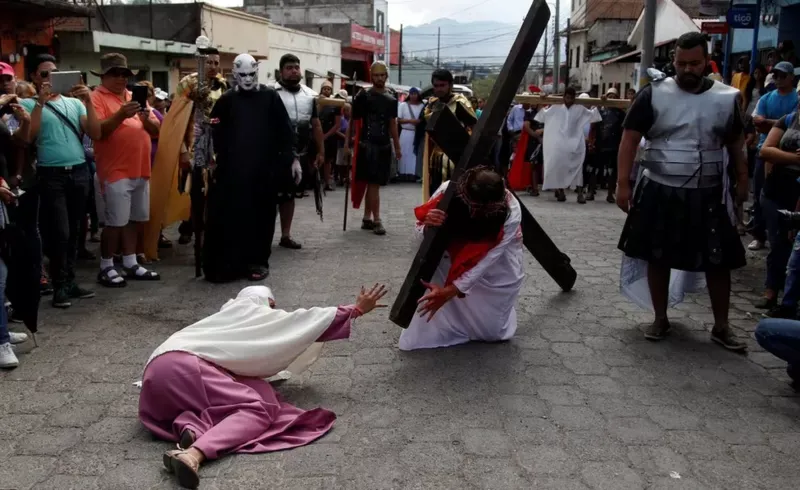When Saint Thomas, one of the 12 apostles of Christ, was told that Jesus would return from the dead, he did not believe it.
According to the Gospel of John (20:24-29), Thomas went so far as to say: “Unless I see the nail marks in his hands, and stick my finger into the place of the nails, and stick my hand into his side, I won’t believe.”
LOOK: Easter: why do the dates change every year? (and how Christian and Jewish Passover differ)
When Jesus of Nazareth resurrected, according to the Bible, he went to meet his apostles and recriminated his skeptical follower, because he needed to “see to believe”.
“Because you have seen me, Thomas, you believed; blessed are those who have not seen, and have believed”, said Christ, who would have risen on the third day after being crucified, according to the New Testament gospels.
More than 2,000 years after the life, passion and death of the “son of God”, we hear the phrase “seeing is believing” in many contexts.
When we mistrust an athletic feat, doubt the beauty of a place, or disbelieve a fantastic narrative, we tend to say “seeing is believing”.
Perhaps unknowingly, we recreate a biblical passage every time we use that phrase to record our disbelief.
And it is not the only one.
Are many phrases we say and we hear daily that they have a religious origin.
Taking advantage of the fact that it is Easter, we tell you some of them.
“I wash my hands”
“Then Pilate, seeing that nothing progressed, but rather that a tumult was promoted, took water and washed his hands in front of the people saying: ‘I am innocent of the blood of this just man. You will see’”. (Matthew 27:24).
Thus, Pontius Pilate, a prefect of Judea at the time, disregarded the popular decision to crucify Jesus.
By Passover, the authority had given the crowd the chance to save one of those condemned to die, and the people chose the notorious bandit Barabbas instead of Jesus, the “king of the Jews.”
The gospels tell that, a week before and in that same place, Jesus was acclaimed as king by the same crowd that would later decide that he be crucified.

Jesus of Nazareth would be tortured and humiliated before being nailed to a wooden cross, acts for which Pontius Pilate “washed his hands”.
In this way, this man went down in history as the symbol of personal convenience and his phrase would be repeated millions of times to imply that responsibility is not assumed for what is about to happen.
“The kiss of Judas”
If you call someone Judas whose name is not Judas, it is very possible that you are implying that he is a traitor.
What the apostle Judas Iscariot did to Jesus of Nazareth became a disloyalty symbol.
According to the gospels, the apostle revealed the location of his teacher so that he would be captured and executed in exchange for 30 silver coins.
Judas not only leaked the place where Jesus could be discovered and trapped, but also pointed it out through a gesture.
“’The one I will kiss, that is: turn him on’. And she right away she went up to Jesus and said ‘Hail, teacher!’ and he kissed him”. (Matthew 26:48-49).
Even in our days the controversy remains about what was the true role that the apostle played in the death of Jesus, but few doubt that “the kiss of Judas” means treason.

“Not only of bread the man lives”
Lent precedes Holy Week.
It is the period that represents the 40 days and 40 nights of fasting that Jesus went through in the desert, enduring the temptations of the devil.
“Man shall not live by bread alone, but by every word that proceeds from the mouth of God” (Matthew 4:4), Jesus told the “tempter” when he challenged him to turn rocks into bread.
That response from Christ is now multipurpose, and can refer both to spiritual nourishment and to the need to go to a soccer game, for example.
“That is my cross”
The Gospels relate that Jesus was not only tortured before he died, but that he had to carry a heavy wooden cross to a place called Golgotha, where he would be crucified.

The last journey of the “son of God” also generated a phrase that we can hear in many contexts.
It can be a demanding job, an addiction, a close person who constantly causes us problems or an old love that we cannot forget.
People, when referring to that “burden” that they have to bear, usually say “that is my cross”.
* This article was originally published on April 14, 2017
Source: Elcomercio

:quality(75)/cloudfront-us-east-1.images.arcpublishing.com/elcomercio/3DOVMXKACBFZFGZVXG7MTMN63Q.webp)

:quality(75)/cloudfront-us-east-1.images.arcpublishing.com/elcomercio/AB2TPA7JHBDP5LA4QE2GFB3X34.jpg)
:quality(75)/cloudfront-us-east-1.images.arcpublishing.com/elcomercio/VGNL2OHSLVFAHOXLUFLXWYVOQI.jpg)


